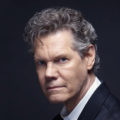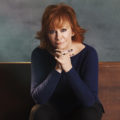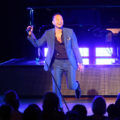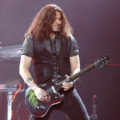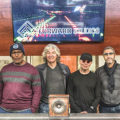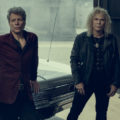All-new “Every Road” pairs country legends Shenandoah, latest A-listers
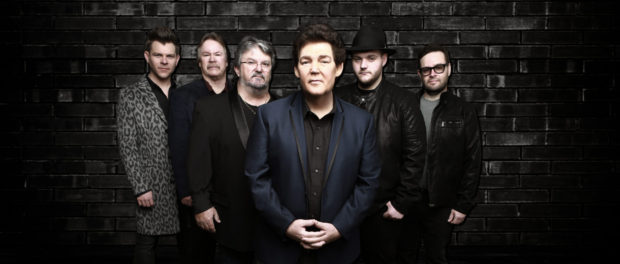 Photo provided by Glen Rose
Photo provided by Glen Rose
Country legends Shenandoah haven’t been shy about recording or touring since reuniting with original singer Marty Raybon in 2014, but believe it or not, the Grammy, ACM and CMA Award-winning group’s new album, “Every Road,” marks its first of entirely original material since 1994.
As if the filling a more than quarter-century gap wasn’t enough, the collection largely consists of collaborations with A-listers who were influenced by these 13-time chart-toppers, including Blake Shelton, Luke Bryan, Zac Brown Band, Brad Paisley, Lady A, Dierks Bentley and Ashley McBryde.
Chicago Concert Reviews heard from the kind-hearted and humble front man about how it all happened, the challenges that came with ruling the charts, feelings on reaching elder statesmen status and a bonus reason beyond a show he hopes to bring Shenandoah to town sooner than later.
What brought you back to all-new music after various covers, live and compilation projects?
 Marty Raybon: Well, that was just it. We had done so many things before. We’d done some live versions of this and that, and when the album was brought up for some thoughts, I said “fellas, I don’t want to do ‘Two Dozen Roses’ again. We’ve already recorded it four times. If we’re gonna do that, radio’s probably going to play the original version. Let’s think about doing some new stuff with artists that are in the business today. Let’s see if we can get up with them and make that happen,” so we did.
Marty Raybon: Well, that was just it. We had done so many things before. We’d done some live versions of this and that, and when the album was brought up for some thoughts, I said “fellas, I don’t want to do ‘Two Dozen Roses’ again. We’ve already recorded it four times. If we’re gonna do that, radio’s probably going to play the original version. Let’s think about doing some new stuff with artists that are in the business today. Let’s see if we can get up with them and make that happen,” so we did.
What we were really trying to do more than anything, we wanted to try and find material that actually sounded like the artists we wanted to be part of the record. One artist made it really, really easy and that was Lady A because Lady A had written [“Every Time I Look At You”]. Although we probably could’ve found a tune that sounded like something they did, nothing was better than having something that they had written, so it really leant itself to appeal to the direction and what we were trying to do with other artists as well.
The Zac Brown Band thing [“I’d Take Another One Of Those”] sounded like some of the earlier stuff they had done. It was that same type of storyline song that would just cry out “I’d take another one of those.” You know, Brad Paisley has a tendency of recording music that has a little bit or humor to it…Then you listen to a tune that’s being played to you and the first line of the song [“Life Would Be Perfect”] says “if chocolate didn’t make you fat and people made a little more sense.” I feel when you hear something like that, you know good and well that’s not serious. That literally leant itself to Brad Paisley. In fact, Brad was the first artist on the record to agree to do it.
How did you go about tracking down all these folks? Were they mutual appreciators, friends or did you reach out to just introduce the idea?
Raybon: It was some of that, and in other cases, it was relationships and that type of stuff. We had done the Hodag Festival up in Wisconsin, and Charles Kelley, his family, and the rest of the Lady A folks had come out and listened to us doing our show. We were on before they were, then we got done, and before it was all over with, Charles and I exchanged numbers. We got to talking and texting, so the next thing you know, they sent the tune over. We said “man, that’s great! Would you be available at this particular time?” Then, all of a sudden, the COVID thing hit. You know there’s blessings and curses with this COVID thing, and the blessing for us, as far as the project, was it allowed us to be able to get stuff done with different artists because everybody had slowed down. People were off the road and they were not out doing dates like we were, so it gave us the opportunity of being able to contact one another and go back and forth about things.
 The Brad Paisley thing came down earlier in the year when we did an Alzheimer’s [benefit] in Nashville for his wife [actress Kimberly Williams, from “Father Of The Bride,” “According To Jim” and “Nashville”]. We talked with Brad [and he said] “man, I would love to be a part of that!” And that was really the same kind of reaction from everybody else as well too. When Charles and I had gone back and forth, they were tickled about doing it and sending the tune. We found the same thing with Zac, Luke Bryan and Blake. We always knew Blake was a fan, not from just knowing Blake, but the last four years, he always had somebody on Team Blake on “The Voice” doing a Shenandoah tune. “Then A Girl Walks In” just kind of led itself. It sounded like a tune that Blake could do by himself and still have a really big record with it.
The Brad Paisley thing came down earlier in the year when we did an Alzheimer’s [benefit] in Nashville for his wife [actress Kimberly Williams, from “Father Of The Bride,” “According To Jim” and “Nashville”]. We talked with Brad [and he said] “man, I would love to be a part of that!” And that was really the same kind of reaction from everybody else as well too. When Charles and I had gone back and forth, they were tickled about doing it and sending the tune. We found the same thing with Zac, Luke Bryan and Blake. We always knew Blake was a fan, not from just knowing Blake, but the last four years, he always had somebody on Team Blake on “The Voice” doing a Shenandoah tune. “Then A Girl Walks In” just kind of led itself. It sounded like a tune that Blake could do by himself and still have a really big record with it.
Were there any contributors you were surprised to hear were fans?
Raybon: I think everybody was pretty even on that. I was just thinking that we hadn’t had records out in a while, so therefore, we really were not relevant as far as the business per se at the time. “There’s probably gonna be a little resistance” or “I may have to see if I can call in some favors,” but I found that absolutely to be completely opposite. In fact, again, [the reaction] when I’d either text or call on the phone was “man, are you kidding me? Ya’ll want me to be on this record with you?” It was almost like, “man, this is unbelievable!” Then [Kenny] Chesney and Tim McGraw had spoken up that they wanted to be a part of it, but at that time, we were already done.
Given that this is a multi-generational effort, how does it feel to be elder statesmen of sorts?
Raybon: We’re still trying to get used to it. We get introduced as “legends” and you get to thinking, “well, first off, we’re not even that old! We’re not old enough to be legends.” And another thing, you gotta honestly, truly, take the time to respect what people feel about you so that you can show the respect back. For them to say what fans they were, how they grew up listening to your music, “you were the reason why I got into music” and “the songs that you did were the first songs that I learned,” you get to thinking, “man, that really is what you want to do when you first start out as a career.” You want to do the best records that you can. You want to be able to reach and touch people in the farthest depth of their heartstrings, to be able to pull and tug at ‘em. You really want to try to do the kind of material that would move them, whether make ‘em laugh or make ‘em cry. That’s what we always try to do…and the reaction that we’re getting from these folks is that maybe, honest to God, we pulled it off.
What was it like being in the center of the country crossover boom of the ‘80s and ‘90s?
 Raybon: At the time when we were doing this, the record label business was way different than what it is today. I mean literally to the point that you’d have a record label telling you “look, you’re only as good as your last record.” Of course, we wouldn’t believe that because we’d see loyalty in fans. As far as the industry and as far as the music business end, he wasn’t wrong, but the sustainability of us being around, even today, is because of that loyalty that we’ve had from fans and the friendships that accumulated from it. We never looked at ourselves as thinking “we’ve got 13 number one records, man, we’re a big deal here.” We were not afforded that opportunity or that luxury to go “we actually can take it easy.” We’ve got the label and management going “look fellas, you better dig in hard. This is what you’re gonna have to do. There’s a lot of competition out there.” The hand would never be taken off of you. The pressure was always on.
Raybon: At the time when we were doing this, the record label business was way different than what it is today. I mean literally to the point that you’d have a record label telling you “look, you’re only as good as your last record.” Of course, we wouldn’t believe that because we’d see loyalty in fans. As far as the industry and as far as the music business end, he wasn’t wrong, but the sustainability of us being around, even today, is because of that loyalty that we’ve had from fans and the friendships that accumulated from it. We never looked at ourselves as thinking “we’ve got 13 number one records, man, we’re a big deal here.” We were not afforded that opportunity or that luxury to go “we actually can take it easy.” We’ve got the label and management going “look fellas, you better dig in hard. This is what you’re gonna have to do. There’s a lot of competition out there.” The hand would never be taken off of you. The pressure was always on.
We were always trying everything in the world we could to make a better record than we did the last time. There were some records that were big and some records that even today have wound up returning. You can look back on them and go “wow,” but I honestly and truly would’ve given anything in the world back then to be able to understand that’s what was going on, instead of it all being just a blur. The one thing that we tried to do since this resurgence is we’ve tried to not analyze or dissect anything like that, but to take a little bit of time with this and let’s stop and smell the roses, two dozen of them if we have to!
When you’re going at such a breakneck speed, you don’t realize the impact that music has on people [like when you hear] “‘Mama Knows’ changed my life. You gotta understand we were going through a bad time and my mom got sick. Then when my mother passed away, I couldn’t wait to hear it the next time it came on the radio.” When you hear people say that, you get to thinking that song literally impacted their life…and that should never, ever be taken for granted.
Walk us through working with Alison Krauss on “Somewhere In The Vicinity Of The Heart.”
Raybon: First and foremost, I don’t even believe that Alison even realizes what an anointing that she has on her life. God literally reached down and put a thunderbolt in her vocals. It reaches out, pierces, captures and draws you into her. The record label [Liberty] came to us and said “we need to get you guys some hardware. Look, we want to do something that’s never been done before. We want to take a self-contained band and we want to take a female artist to do a duet together” as an angle to possibly go after CMA’s “Vocal Event Of The Year.” [We said] “that’s great.” “Well good, here’s the list of some female artists to consider.” Martina McBride was on that list. Patty Loveless was on it.
 I said, “well look, I grew up in bluegrass music. I know this gal and I’ll tell you this gal can forever more sing. If you’re asking us to do a duet with a female and you’re saying we can have our choice, then can I bring the name Alison Krauss up to you?” They kind of looked at one another and one guy said “I’ve never heard of her.” “You’ve never heard of Alison Krauss?” And of course the head of the label, Jimmy Bowen, goes “I know Alison. I’ve tried to do everything to get her to sign to this label. If you can get her on the record and we put it on this label, you go get her!”
I said, “well look, I grew up in bluegrass music. I know this gal and I’ll tell you this gal can forever more sing. If you’re asking us to do a duet with a female and you’re saying we can have our choice, then can I bring the name Alison Krauss up to you?” They kind of looked at one another and one guy said “I’ve never heard of her.” “You’ve never heard of Alison Krauss?” And of course the head of the label, Jimmy Bowen, goes “I know Alison. I’ve tried to do everything to get her to sign to this label. If you can get her on the record and we put it on this label, you go get her!”
So the next thing you know, we were in the studio with Don Cook producing. We’ve got the track laid down. We already talked about the chord changes and where we needed the tune to be when we made the modulations, so all we had to do that evening was get in the studio and sing. They set us up in a booth where one microphone was on one side and one was on the other, so we actually got to look at one another while we were singing. To sit there, watch her sing and to listen to what was coming through the headphones, it honestly and truly was more than eventful [laughs]. It was just so calming to the spirit. You’d think “my goodness sake, she’s on a record with us!” And bless her heart, she felt the same way. It just worked out to be absolutely wonderful. When it was over with, the Grammy came out of it and [so did] the CMA “Vocal Event Of the Year” that the label was after.
Along the way, do you remember any concerts or trips throughout the Chicago area?
Raybon: We played around ‘93 or ’94 at a little club [The Cubby Bear], so I’m thinking, “is there any way we could catch the Cubs while we’re in town?” This was as close to the summertime as I had been to Wrigley Field, but I did not get a chance to go see the Cubbies play. I don’t ever want them to tear that stadium down. It’s like Fenway. Wrigley Field don’t need to go anywhere…Every time we get a chance to get to ball games out on the road, we do it. That’s the one great thing about being able to go to different parts of the country and take it all in. You go to Philly and you’ve got to eat a cheese steak. You go to New York and you’ve got to eat pizza. You go to Chicago and you’ve got to eat a hot dog. Even the pizza in Chicago’s killer. I always try to take in the festivities of wherever we are in the world. That was the same thing I was saying about the Chicago Cubs and being able to watch them play ball. I don’t know where they were, it was an away game, so anything in the world we can do, I’d love for us to get back to Chicago or anywhere remotely around Cook County.
For additional information on Shenandoah, visit ShenandoahBand.com.


